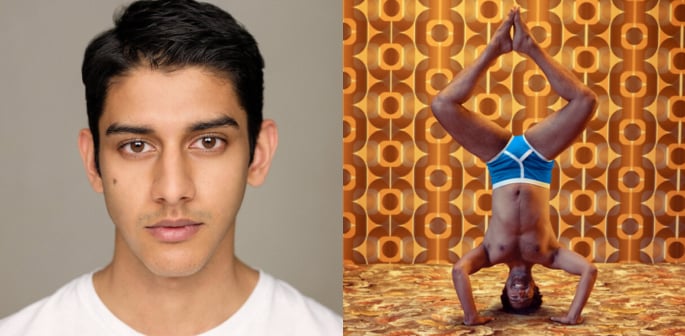"I think everyone will be able to connect with this."
In the vibrant world of late seventies South London, Dee Ahluwalia takes on the role of Karim Amir in the stage adaptation of ‘The Buddha of Suburbia’.
Through Ahluwalia’s eyes, we dive into the essence of Karim, exploring the layers of transformation that resonate with today’s audience as much as they did when the story first unfolded.
From his family’s immigration experiences, Ahluwalia brings a profound understanding and authenticity to his role.
His insights into the discrimination of the period, coupled with the personal revelations he encountered along the way, offer a poignant backdrop to his performance.
As we delve into the interview, Ahluwalia shares his journey of bringing Karim to life on stage, his collaboration with director Emma Rice, and the unique rewards of adapting such a multifaceted character for the theatre.
Did exploring Karim’s world in late seventies South London lead to any personal revelations for you?
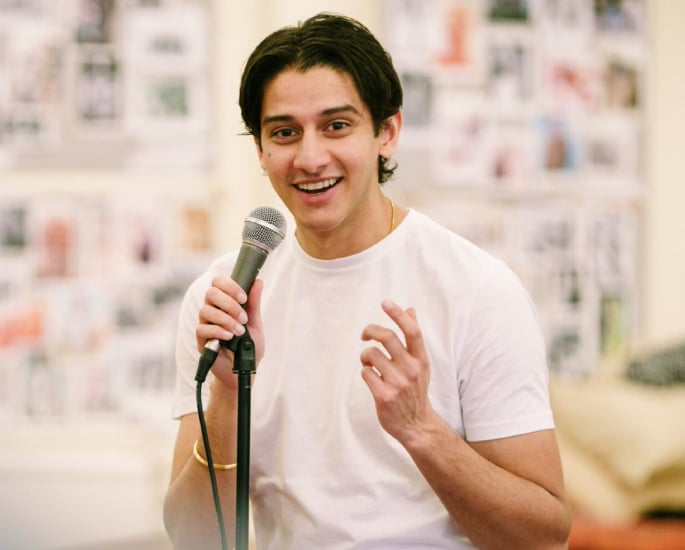 Growing up, I always had my dad and mum there to tell me how it was living and immigrating to the UK being Indians and their experiences.
Growing up, I always had my dad and mum there to tell me how it was living and immigrating to the UK being Indians and their experiences.
My dad immigrated to Manchester and he grew up in Moss Side.
I always heard how bricks had been thrown through their windows and all of the racism and discrimination that came with it.
I think having a piece like this allowed me to dive into actually how awful it was.
You can hear it from your dad and stuff and it’s merely just stories and then when you have a piece like this, you’re required to dive into the actual racism of it.
You need to live through it in the play and the kind of danger of that period being anyone who wasn’t white.
I think that was a personal revelation because it put into perspective what people had to go through, what my parents had to go through, what all immigrants had to go through to get us to the point we are at now.
It’s not perfect but certainly, a lot better than that so definitely a big personal revelation was the appreciation I have for those who managed to come here and build a life.
Getting to play a character like Karim who just goes for it.
He knows the rules but he breaks them and he doesn’t mind questioning things.
For me, as Dee, I’m not trying to take it as far as Karim but certainly, I’ve tried to integrate a bit more autonomy in how I am and the person I am which is taken from playing Karim.
How did you add your personal touch to Karim, building on the novel and TV series?
I think that’s almost one of the most important questions you can ask when doing a piece like this, especially with the stage.
When I was in the process of meeting with Emma, the director and meeting the casting team, the script was there.
I did my research on the book, but I didn’t read the book at that point, because the script was self-contained. And then I got the role, and then I read the book.
But then I said to myself, this book translates perfectly to TV and film, but on stage, especially in an Emma Rice adaptation, it needs to have a different kind of energy.
So, I’ve tried to stop myself from trying to impersonate the book.
I didn’t watch the TV series. But, I’ve tried to not impersonate the book and tried to say to myself, that all of the information from the book is living in me.
And that will kind of find its own form and own voice.
On stage, it’s going to find a different voice and a different expression through me naturally.
How did Emma Rice’s description of the adaptation as a ‘theatrical whoop’ influence your portrayal of Karim, and what aspect do you think will most surprise the audience?
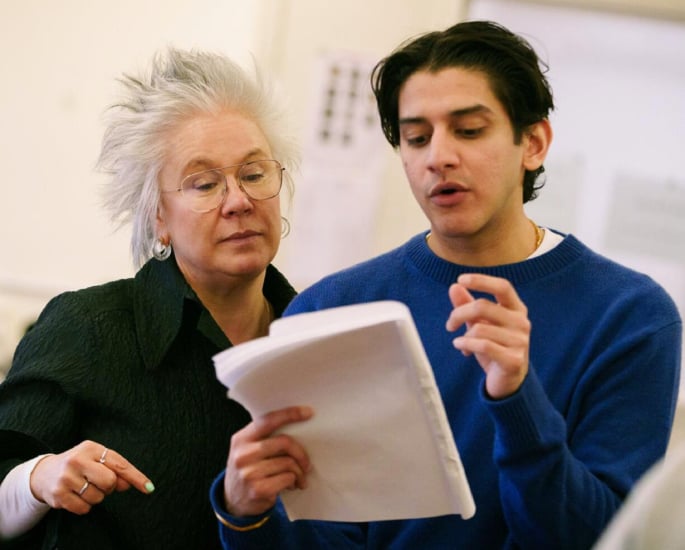 I think if you’ve read the book, there’s nothing that will catch you off guard.
I think if you’ve read the book, there’s nothing that will catch you off guard.
Because Emma has so much reverence for Hanif and his work and Hanif has been very, very involved in the making of this, he’s adapted with Emma, the script.
And it’s just as in some places, rude and raucous as the book so I don’t think you would be surprised.
It’s just as chaotic in places and messy and rude and whatnot.
On stage, it is different, it lives and breathes differently and it’s more visceral.
I think it translates the essence and energy of the book in such an incredible way.
It still maintains that richness of language that Hanif is so incredible at.
How does Karim’s journey reflect the late seventies’ changes, and do you see parallels in today’s world?
Throughout, it’s set on the eve of the election in 1979, the third of May.
It’s set on the eve, that’s where we are in the present day.
I think that level of uncertainty is throughout the piece, the level of where are we going, what are we doing?
I think that in a societal, political sense leads through into Karim certainly like he’s trying to find himself.
So, I think you’ll feel that by watching it.
What conversation do you hope Karim’s story ignites about finding our place in today’s world?
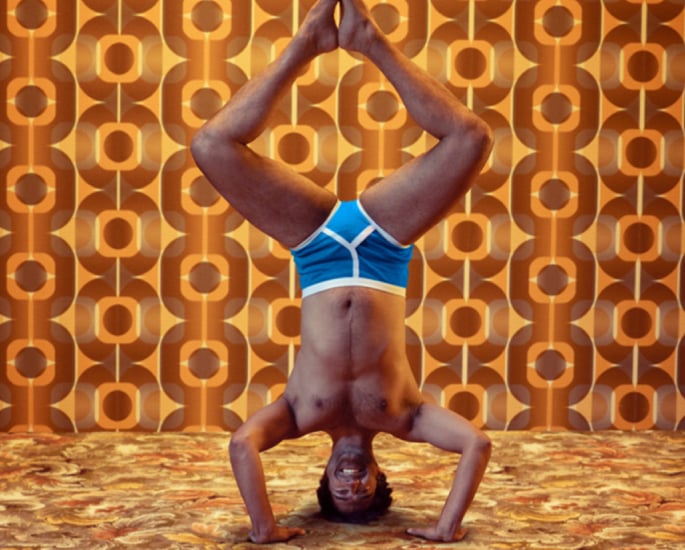 I think it’s huge. I think that’s one of the beautiful bits about what’s been written.
I think it’s huge. I think that’s one of the beautiful bits about what’s been written.
Karim is just utterly flawed as a person, which we all are and I think for some South Asians, that’s so important to see.
If I was growing up and I saw this, I would be like wow, that is exactly like me.
I’m hypocritical, I contradict myself in places, I’m trying out new things, and it’s that full flesh, 360 view of a person.
I think seeing that will help people be more certain about asking those questions themselves.
When you see yourself represented, all the aspects of yourself, you feel as if you can certainly ask those questions about yourself.
How do family, theatre, and music influence the show and your portrayal?
We have an incredible composer, Niraj, and he’s put together some incredible pieces influenced by that period.
Music is a big part of Hanif’s life and when you come to see this, you will see a lot of incredible little bits of music integrated into it.
It’s just one of those things in the rehearsal process where you’re doing a scene and then, Simon Baker, our sound designer, will implement a piece of music or a score and suddenly, it will completely change the way you relate to this scene.
It will change the way that all of us, as actors, perform it.
I think it’s been integral to the whole process.
How has Emma Rice’s unique direction influenced your portrayal of Karim?
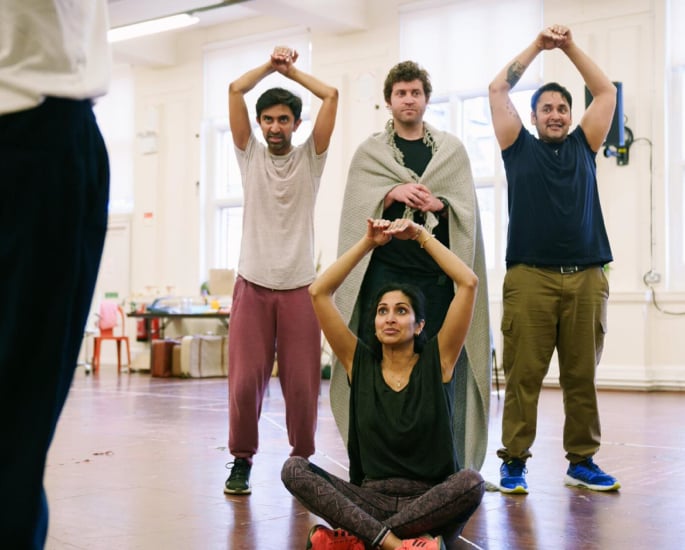 It’s been incredible. She is just one of the most magical, and I mean this genuinely, one of the most magical people I’ve ever come across.
It’s been incredible. She is just one of the most magical, and I mean this genuinely, one of the most magical people I’ve ever come across.
It’s a complete collaboration. Sometimes, you work with directors with a specific vision and they want to block it in this way, they want to put it in this way and you’re just there to fill those pieces for them.
With Emma, it’s a complete collaboration in the room and there’s a sense of fun and a sense of play which is entertaining.
What you’ll watch, no one will be bored watching this.
The tip of the iceberg is it’s an entertaining piece but somehow she weaves into you the absolute depth sensitivity and vulnerability all these characters in the play have especially Karim.
It’s just been incredible to be a part of, I feel blessed to work with her on this.
What keeps people returning to ‘The Buddha of Suburbia’ from novel to stage?
I think Hanif just can communicate the human experience. It’s kind of like the question – what makes a great writer great?
I wouldn’t be able to do it. It’s just his honesty and vulnerability weaved in with his ability to manipulate the English language in a way that resonates.
It’s so rich in language and funny, he’s hilarious and the stuff he’s written is hilarious.
I think that’s what keeps us coming back to any piece of art.
I think it was Cillian Murphy talking about Nolan’s work. He was like great art doesn’t tell us the answers, it asks questions and I think that’s what keeps us coming back.
‘The Buddha of Suburbia’ asks you questions, it doesn’t tell you what the right way to be is.
There are so many scenes in this, we were just doing one the other day where Karim has a point of view and he’s arguing against someone else who has a different point of view and both are right and both are wrong.
It’s asking questions to the audience that each member of the audience will have a different point of view on it.
That’s what Hanif has done in his work, you read it and he’s constantly asking you questions.
Does any part of Karim’s story personally resonate with you?
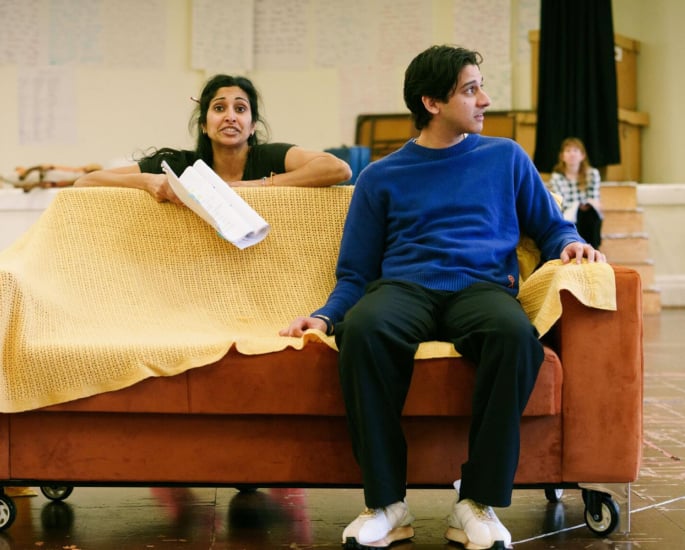 Weirdly, all of it. I don’t know if it’s that identity diffusion stage in the acting process that it’s very hard to separate yourself from the character.
Weirdly, all of it. I don’t know if it’s that identity diffusion stage in the acting process that it’s very hard to separate yourself from the character.
I think coming into the acting world, theatre is a big part of the play and a big part of the book.
Karim becomes an actor and does the theatre stories where the director talks to directors and the other cast members.
I know I mentioned it earlier about having a personal sense of autonomy.
It resonates a lot because sometimes, as an actor, when you’re young or inexperienced, you tend to say yes a lot and you don’t allow your voice to be heard.
You don’t take up space in the room. There is a certain hierarchal structure in the room and you must adhere to it and you must not question it.
The way Karim handles those situations, resonates a lot because it’s that push and pull of this job that means a lot to me and I must not question it but why not because this is how I feel and why shouldn’t I have a voice?
It’s probably because we just rehearsed them, but that’s a story that sticks out right now.
What excites you most for audiences to see at the premiere?
I’m excited for everyone to see it from teenagers to older people.
No matter your colour or class or whatever it is, I think everyone will be able to connect with this.
I’m looking forward to that because it’s one of those things where if people come into the theatre as they should and say I’m going to open my mind, open my heart and take this all in, I think it will connect with people.
I’m excited for that and I’m excited to share this thing that we’ve created together with the cast.
There’s so much love for this piece from us and if you present something with so much love, those who watch it can only really feel the love of the piece so I’m excited.
As the curtains prepare to rise on ‘The Buddha of Suburbia’, Ahluwalia stands at the precipice of a theatrical triumph.
His portrayal of Karim promises to captivate audiences with his honesty, humour, and humanity.
Dee Ahluwalia’s journey through the world of ‘The Buddha of Suburbia’ has been one of profound personal and artistic growth.
From understanding the story’s historical context to embodying Karim’s rebellious spirit, Ahluwalia has immersed himself in the role.
As we conclude our conversation, it’s clear that Ahluwalia’s experience with ‘The Buddha of Suburbia’ is a testament to the power of storytelling to bridge the past and present, to challenge and inspire.
Discover more about the play and secure your tickets by clicking here.




















































